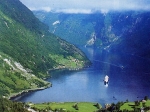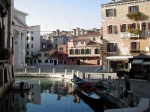
 Greece , formally called the Hellenic Republic , is a country in the southeast of Europe on the southern tip of the Balkan peninsula . It has land boundaries with Bulgaria , the Former Yugoslav Republic of Macedonia and Albania to the north; and with Turkey to the east. The waters of the Aegean Sea border on Greece to the east, and those of the Ionian and Mediterranean Seas to the west and south. Regarded by many as the cradle of Western civilization , Greece has a long and rich history during which its culture has proven especially influential in Europe , Asia and Africa .
Greece , formally called the Hellenic Republic , is a country in the southeast of Europe on the southern tip of the Balkan peninsula . It has land boundaries with Bulgaria , the Former Yugoslav Republic of Macedonia and Albania to the north; and with Turkey to the east. The waters of the Aegean Sea border on Greece to the east, and those of the Ionian and Mediterranean Seas to the west and south. Regarded by many as the cradle of Western civilization , Greece has a long and rich history during which its culture has proven especially influential in Europe , Asia and Africa .
Geography
The country consists of a large mainland at the southern end of the Balkans ; the Peloponnesus peninsula, -- separated from the mainland by the canal of the Isthmus of Corinth ; and numerous islands , including Crete , Rhodes , Euboea and the Dodecanese and Cycladic groups of the Aegean Sea . Greece has more than 14,880 kilometres of coastline and a land boundary of 1,160 kilometres.
About 80% of Greece consists of mountains or hills. Dry and rocky conditions prevail in much of the country is ; only 28% of the land classes as arable. Western Greece contains lakes and wetlands. Pindus , the central mountain range, has an average elevation of 2,650 m. Mount Olympus forms the highest point in Greece at 2,911 m above sea level.
Greece's climate features mild, wet winters and hot, dry summers. Temperatures rarely reach extremes, although snowfalls do occur in the mountains and occasionally even in Athens in the winter.
Seals , sea turtles and other rare marine life live in Greek seas, while Greece's forests provide a home to Western Europe's last brown bears and lynx .
Economy
Greece has a mixed capitalist economy with the public sector accounting for about half of GDP . Tourism has great importance, providing a large portion of GDP and foreign exchange earnings. Greece also counts as a world leader in shipping (first in terms of ownership of boats and third by flag registration) . Greece figures prominently as a major beneficiary of EU aid, equal to about 2.4% of GNP. The export of manufactured goods, including telecommunications hardware and software, foodstuffs and fuels accounts for the rest of Greek income.
The economy has improved steadily over the last few years, as the government tightened policy in the run-up to Greece's entry into the zone of the EU's single currency, the euro , on January 1 , 2001 . Average per capita GDP in 2003 comprised $20,000 . Greece has an expanding services sector and telecommunications industry and has become one of the largest investors in her region. Moreover, Greece now operates as a net importer of labour and foreign workers (mainly from the Balkans, Eastern Europe, the Middle East and Pakistan) now account for 10% of the total population.
Major challenges remaining include the reduction of unemployment and further restructuring of the economy, including privatising several state enterprises, undertaking social security reforms, overhauling the tax system, and minimising bureaucratic inefficiencies. Forecasts predicted economic growth of 4 - 4.5 % in 2004 . Reducing the government deficit also remains a major challenge, notably after the conservative new Greek Government revealed to Eurostat in 2004 that the previous, socialist, Greek government finance statistics, on the basis of which the European institutions accepted Greece to join the Euro zone, contained some creative accountacy
The Bank of Greece functions as the national central bank of Greece; distinguish this from the " National Bank of Greece ", a commercial bank.
Demographics
According to the 2001 census, Greece had a population of 10,964,020. Of those, 58.8% lived in urban areas, whereas only 28.4% lived in rural areas. The population of the two largest cities in Greece, Athens and Thessaloniki , reached almost 4 million. Although the population of Greece continues to grow, Greece faces a serious demographic problem: for the first time in 2002 the number of deaths surpassed the number of births.
A large number of immigrants live in Greece today, estimated at over one million. About 65% have come from Albania , and large-scale Albanian migration to Greece since the fall of Communism in Albania has become a source of conflict in Greece because the Greek-Albanian borders opened without any preparations from the Greek government in terms of immigrant facilities. The Albanians occasionally suffer from discrimination and exploitation in Greece, and have a reputation (in the popular perception) as trouble-makers and criminals. Nonetheless most Greeks nowadays recognize their contribution to the Greek economy. (Several prominent Greek sportsmen immigrated to Greece as ethnic Greeks from Albania or Georgia in the 1990s.) Smaller numbers of immigrants came from Bulgaria , Serbia , Romania , Pakistan , Ukraine , Belarus , Poland , Egypt , Palestine , Ethiopia , Bangladesh , China and Georgia . The exact number remains unknown, since the majority live illegally in Greece.
Greece has various, if not numerous, linguistic and cultural minorities. A non-comprehensive list of these would include various Roma groups, Turkish -speakers, Slavs , and Vlachs , ( Aromanians and Megleno-Romanians ). Numerous religious minorities exist: Muslims form the largest such minority.




